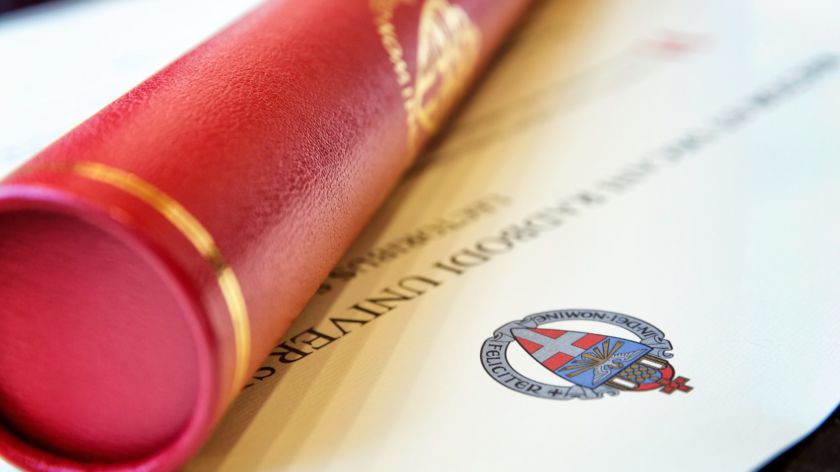Rector: ‘External PhD candidate deserves better supervision’
-
 Foto ter illustratie. Door Dick van Aalst
Foto ter illustratie. Door Dick van Aalst
Rector Han van Krieken wouldn’t vouch for the quality of all of the PhD theses produced at Radboud University. His concerns lie with the external PhD candidates, a group of researchers who are not employed by the university. As the Rector feels that every PhD candidate deserves good supervision, he has announced measures intended to ensure this.
Han van Krieken is familiar with the sad cases: PhD candidates who, after years of hard work, are told that their thesis is below par. And this even though they’ve travelled abroad, done fieldwork – paid for everything themselves. ‘You really want to prevent this.’
Last year external PhD candidates suddenly became a hot topic in the Netherlands after it had been discovered that these researchers in Tilburg contributed to an earning model: the university in Brabant was accused of having created a PhD factory with the goal of graduating as many external PhD candidates as possible in order to earn as much PhD-bonus financing as possible.
This is why the Rector of Radboud University is working with three other rectors in a VSNU (Association of Universities in the Netherlands) committee to consider the status of external PhD candidates. These special researchers are not on the university’s payroll and are thus not an employee; but often at their own initiative, they have found a professor who is prepared to supervise them. Since some external PhD candidates write up their research – literally or figuratively – in their own room, they remain outside the university’s field of vision.
‘I would vouch for the quality of theses produced by regular PhD candidates. But not for those by external PhD candidates.’
‘In most cases, that isn’t a problem,’ said Van Krieken. ‘There are indeed very good PhD theses written by external PhD candidates.’ He placed two voluminous books on the table, each at least 800 pages long. ‘Written by external PhD candidates. That would never have been possible in the four years normally allotted to a PhD.’
The problem, Van Krieken explained, is in guaranteeing the quality. ‘I would vouch for the quality of theses produced by regular PhD candidates. But I simply cannot do the same with absolute certainty for those by external PhD candidates.’ There is also a considerable difference between the contract PhD and the external PhD candidate. The former enrols at the university and plans a programme that is evaluated by the research group. In addition, he or she always has two supervisors and a mentor plus an annual evaluation.

In contrast, the trajectory of the external PhD candidate is often based on one-on-one meetings and good faith. If a professor no longer believes in the PhD research or if a conflict arises, he’s legally allowed to stop supervision. In that case, the only thing the PhD candidate can do is look for a new supervisor.
What do you and your fellow rectors want to change with regard to the position of the external PhD candidate?
‘In the first place, each external PhD candidate must enrol at the university. Then, just as with regular PhD candidates, a programme plan and a supervision plan must be drawn up, and the PhD candidate must be given an independent mentor. After the first year, there will be a go/no-go-meeting. If the results are positive, the university must support the PhD candidate – even if things are not going well. Almost every PhD candidate has to go through moments like this.’
‘It’s often difficult for supervisors to tell PhD candidates to stop. I know a case of a PhD candidate who’d been researching for years and whose supervisor expected that the candidate himself would give up. But that didn’t happen. It was so painful. As a supervisor, you almost get into the situation of thinking: I’ll just write a bit for him myself. You can’t let things get this far, of course.’
‘You hope that the discussion will be about the contents of a PhD thesis and not about its quality’
Will the external PhD candidate get more rights?
‘The external PhD candidate is entitled to the supervision that is needed. For that, he must become much more embedded into the department than is sometimes now the case. This includes access to the library, an email address, courses and the opportunity to present work.
How do you want to oversee the new regulations?
‘If the regulations for external PhD candidates become the same as those for regular PhD candidates, I don’t expect anything less than that supervisors will follow these regulations. That works well for the regular PhD candidates.’
Are you concerned about the university’s reputation in addition to the personal misery of the PhD candidate who hits a dead end? You don’t want to give a degree to people who aren’t really good enough.
‘Absolutely. A title from Radboud University has to mean something. We want to safeguard that.’
Do you know examples of researchers who got their PhD in Nijmegen, but whose theses were really not up to scratch?
‘That’s difficult to say. I can only answer this for my own subject area. Of course I know examples of PhD theses that involved a lot of fuss, like the one by Claudia Hoekx and the one by Peggy Bosch, who had researched the possible therapeutic effect of acupuncture in treating depressions and schizophrenia. I’m not going to pass a scientific judgment on their work, but you hope that the discussion will be about the contents of a PhD thesis and not about its quality.’
Is it harmful if there’s commotion about PhD research?
‘Yes, I think it is. Serious doubt about the quality of PhD research is harmful to the researcher and also to the reputation of the university.’
Two and a half years ago, the Executive Board said it wanted better registration of PhD candidates. At the time this group was hardly visible. Did that happen?
‘Visibility is a now bit less cloudy because, increasingly often, departments have their external PhD candidates enrol at the university. But we haven’t yet made this mandatory. It’s impossible to precisely say how many external PhD candidates are connected to our university. We want a clear idea of this in the future.’
The radio programme Argos disclosed that one professor in Tilburg had supervised 77 PhD candidates in 6 years. Is that also possible in Nijmegen?
‘We don’t know how many PhD candidates each professor supervises. We simply can’t extract that information from our system. But I think it’s very improbable. What sometimes does happen is that associate professors do most of the supervision, but the professor is the official supervisor. That doesn’t have to be a bad thing as long as the team works well together.’
Shouldn’t the PhD bonus (in 2019: 78,000 euros per PhD candidate for the university involved) be stopped? Then you remove the stimulus to enrol as many PhD candidates as possible
‘We used to have open-end financing: the government contribution rose with each PhD candidate. And you saw indeed that the number of PhD candidates quickly grew. Now a ceiling has been set: a maximum of 20 percent of the research share of the first-flow funding (the direct government funding to the universities, ed.) is for PhD work. That takes away an important financial stimulus.’
‘Perhaps external PhD candidates should also pay a contribution’
‘But I think it’s important to continue to have a stimulus. The most important reason: otherwise we’d be better off hiring postdocs. They work independently, don’t need to follow courses and need no supervision. A PhD candidate costs time. Without a financial stimulus, those people simply won’t be trained even though they’re very important. Both for society, where employers are eager to have personnel with a PhD, and for maintaining the learning academy.’
The PhD Candidates Network Nederland advocates a revision of the PhD system and wants to lower the bonus for ‘inexpensive’ PhD candidates like the external PhD candidates.
‘The bonus is also important for external PhD candidates. I would prefer to see external PhD candidates getting good supervision and for us to offer the infrastructure needed for good research. That can be paid for from the bonus.’
‘What you should also think about is whether external PhD candidates themselves should contribute to the supervision trajectory. My fellow rectors and I definitely don’t want to exclude this option. But you have to ask yourself how much that amount should be. It can’t become an earning model.’
Will Radboud University ask money from external PhD candidates?
‘We’ve agreed that the universities will all follow the same line on this theme. It hasn’t happened yet in Nijmegen, but there are departments who would find a contribution reasonable. Supervision is quite intensive: if you calculate what it costs, it’s a lot of money. In addition, the departments want to create a threshold so that people don’t just simply decide to start. If PhD candidates pay a share, they can also demand to get something in return in the form of good supervision and facilities. You then have the mutual responsibility of bringing the trajectory to a good end.’
‘Not a logical step’
The PhD candidates Network Nederland, the national representative of PhD candidates, has said that it’s ‘not a logical step’ to ask for money from external PhD candidates. ‘We feel that, as a university, you should give external PhD candidates good supervision, even if you don’t ask them to pay,’ said chair Anne de Vries. ‘The universities should first improve the quality of supervision.’
Because of the PhD bonus, external PhD candidates already contribute a lot of money if they reach the end of their programme. ‘Almost always more than what they had cost,’ stated De Vries, who is doing research at Tilburg Law School. ‘They often have no budget for research or travel and pay for everything themselves. If you ask for a financial contribution, you’ll run the even bigger risk of the PhD candidate becoming a cash cow. As a university you can say that external PhD candidates shouldn’t be an earning model, but this sort of financial stimulus encourages that.’
There are universities that ask for money from their external PhD candidates. But according to De Vries, the external PhD candidates haven’t always had good experiences with this. ‘At some places things are arranged well, but we also hear about PhD candidates who don’t get much in return for their money.’
Lastly, De Vries is concerned about the accessibility of the external PhD candidate trajectory. ‘You often see that external PhD candidates are working for a company. Those employers will perhaps be willing to pay. But the external PhD candidate who wants to begin a PhD study based purely on interest will find it more difficult. There’s a danger that being an external PhD candidate will become something elitist – for people who can pay it themselves or whose boss pays.’



